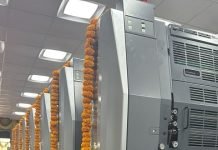Started as a publishing company in 1979, Faridabad-based VK Global ventured into the printing and packaging industry with the acquisition of the Rave Scans plant in Manesar in 2018. Recently, the company moved its entire book and packaging production unit from Manesar to a brand-new purpose-built plant in Faridabad built on a five-acre plot of land. Apart from various equipment additions to the large-scale capacity in Manesar, the company has added a brand new Heidelberg CX 75 6-color plus coater packaging press with interdeck UV curing right at the commissioning of the modern plant.
The acquisition of nine Heidelberg presses from Rave Scans in 2018 laid the foundation for a robust infrastructure, while the strategic decision to sell one press in 2020 and acquire a Heidelberg SM 102 8-color perfecter has strengthened VK Global’s print capacity, especially for book production exports. Moreover, the addition of the Heidelberg CX 6-color plus coater UV press and another Bobst Novafold folder-gluer enhances the company’s considerable carton-making capacity for maximum output.
The printing side of the business is based on 10 Heidelberg presses with a printing capacity of up to 15,00,000 sheets per day. For commercial and book printing, it is equipped with two Muller Martini flow lines for center-pinning, two Welbound machines, and a Heidelberg machine for the perfect binding of books. For the carton side, there is a battery of Bobst die-cutting, and folding and gluing machines.

Photo- PSA
In our interaction, Namit Jain director of VK Global shed light on the growing graph and demand for book printing. According to him, the surge in book printing post-Covid-19 is due to the consolidation of the book printing industry as numerous presses shut down during the pandemic. Although there was a surge in digital adoption during the pandemic, he asserts that traditional methods of teaching are likely to endure for a longer period. Although VK Global has occasionally ventured into digital engagement through the Xam Idea app, it remains skeptical about a substantial shift towards EdTech in the education sector.
“The commercial sector saw a hit during the Covid-19 pandemic and lockdowns, whereas packaging is a far more stable industry and is going to grow. It is just about how you can optimize your production to improve your profitability. Although commercial is a little more volatile in terms of demand, I believe it to be more profitable than packaging,” Jain said.
Catch in the growth of rigid box packaging
In the realm of packaging solutions with folding cartons, the company focuses on pharmaceutical, food packaging, and liquor, and in the rigid box category, it focuses on luxury packaging, corporate gifting, and the FMCG sector. In the rigid box packaging sector, the Heidelberg printing lines are complemented by two automatic Emmeci box-making machines from Italy along with one Fuchu.
Sharing insights into the rigid box industry, Jain says that the hard box packaging industry is highly stable but there’s a catch to it. “In 2021, the industry ramped up and experienced a significant boom. In 2022, the demand exploded but in 2023 – it has merely sustained and seems to be going down,” says Jain. He attributes this pattern to the entry of start-up companies that have embraced rigid box packaging for their products, especially in the FMCG sector. While established companies have leaned towards mono-carton packaging even though they can shift to rigid box packaging, startups are aggressively adopting rigid boxes for FMCG products such as perfumes, moisturizers, and many other high-value products, and this may hamper the financial results of startups negatively, thereby eventually impacting the rigid box packaging industry.
“There’s some stability in mobile phone box packaging, premium gift packaging, sweets, and confectionary packaging, but FMCG is the only segment that has seen an expansion in rigid boxes,” says Jain.
Jain says 80% of VK Global’s revenue comes from monocartons. This sector, he asserts, sustains growth with a stable trajectory. Mono cartons characterized by their simplicity and versatility continue to be the preferred packaging solution for a wide range of products.
Sustainable anti-counterfeiting solution
The VK Global plant manufactures specialty films with several holographic effects that can be transferred with the carrier film to the board and then removed entirely for sending it back into the paperboard waste and recycling stream. Jain explains that whatever metallic effect is being transferred on the board with the carrier film is 100% biodegradable and without any presence of polymer.
While these films are being exported, he expressed his desire to develop the market for these decorative and security films in India. However, he feels that the Indian brand owners and converters may not yet be ready to invest in the new sustainable security technology until and unless there’s a hard rule from the government. The specialty films have been used in a range of packaging applications across monocartons, rigid boxes, self-adhesive labels, and flexible and high-pressure laminates.
Namit Jain believes the growth of the counterfeit product market is largely because of the lack of knowledge of the customer in distinguishing an original from fakes. “it’s the role of the brand owners to educate the end user because the middle man (retailer or distributor) is the one selling the fakes with all his knowledge about the product. The end user and the brand owners are the prey of his unethical deeds,” said Jain.










